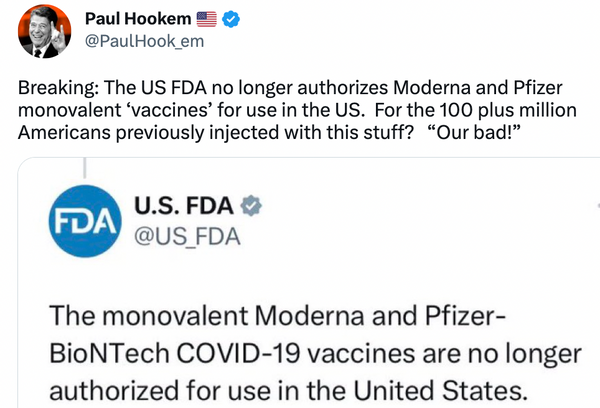FDA No Longer Authorizes Use of Monovalent COVID Vaccines. Here’s What That Means
On April 18, 2023, the U.S. Federal Drug Administration updated existing guidelines to no longer authorize the use of monovalent Moderna and Pfizer-BioNTech COVID-19 vaccines.
A monovalent vaccine’s formula is based on one strain of a virus and intended to fight just that version, whereas a bivalent vaccine is designed to work against multiple variants. The FDA authorized the use of the former first, in late 2020. As variants of the COVID virus emerged, in August 2022, the FDA authorized the use of bivalent vaccines, as well. Then, on April 18, 2023, the agency said those bivalent vaccines could be used for all doses (initial shots and boosters), and that monovalent vaccines were no longer authorized for use “to simplify the vaccination schedule for most individuals.”
On April 18, 2023, several posts surfaced claiming that the U.S. Food and Drug Administration (FDA) was amending existing guidelines to no longer authorize the use of monovalent COVID-19 vaccines manufactured by Moderna and Pfizer-BioNTech pharmaceutical companies. A monovalent vaccine‘s formula is based on one strain of a virus and intended to fight just that version, whereas a bivalent vaccine is designed to work against two or more variants of a virus.
Some posts asserting the claim implied the alleged change was supposedly a sign of the vaccines’ ineffectiveness, or the FDA apparently backing away from the inoculations as a way to prevent COVID-19. “Breaking: The US FDA no longer authorizes Moderna and Pfizer monovalent ‘vaccines’ for use in the US,” tweeted a user. “For the 100 plus million Americans previously injected with this stuff? “Our bad!””

(via PaulHook_em/Twitter)
The claim that the FDA was no longer authorizing the use of monovalent vaccines for both initial shots and boosters was true. However, the implications that the change had anything to do with the vaccines’ effectiveness, or the FDA’s support of them, were not supported by evidence.
The FDA authorized the use of Pfizer and Moderna’s monovalent vaccines first, in late 2020. However, as variants of the COVID virus emerged, in August 2022, the FDA authorized the use of the companies’ bivalent vaccine formulas to improve vaccinated individuals’ odds of combatting not only the original version of COVID but also the Omicron variant strains. According to Johns Hopkins Bloomberg School of Public Health, as of February 2023, the latest bivalent vaccines aimed to protect against newer variants of the virus, as well.
On April 18, 2023, the FDA said those bivalent vaccines could be used for all doses (both initial shots and boosters), and monovalent vaccines were no longer authorized for use, “to simplify the vaccination schedule for most individuals.”
We reached out to the FDA to ask if, or to what extent, health workers were using monovalent vaccines, as of mid-April 2023, and what they should do with those vaccines now that they’re no longer authorized for use. We will update this report when we receive a response.
To institute the change, the agency amended 2020 documents that authorized the initial use of Moderna and Pfizer vaccines, called Emergency Use Authorizations (EUAs). The FDA issued its first EUA for Pfizer’s vaccine on December 11, 2020, and it issued an EUA for Moderna‘s vaccine a week later.
The agency made the April 2023 announcement in a news release and Twitter thread, writing in the latter:
Most individuals, depending on age, previously vaccinated with a monovalent COVID-19 vaccine who have not yet received a dose of a bivalent vaccine may receive a single dose of a bivalent vaccine.
Most individuals who have already received a single dose of the bivalent vaccine are not currently eligible for another dose. We intend to make decisions about future vaccination after receiving recommendations on the fall strain composition at an FDA advisory committee in June.
Individuals 65 years of age and older who have received a single dose of a bivalent vaccine may receive one additional dose at least 4 months following their initial bivalent dose.
Most individuals with certain kinds of immunocompromise who have received a bivalent COVID-19 vaccine may receive a single additional dose of a bivalent COVID-19 vaccine at least 2 months following a dose of a bivalent COVID-19 vaccine.
Additional doses may be administered at the discretion of, and at intervals determined by, their healthcare provider. However, for immunocompromised individuals 6 months through 4 years of age, eligibility for additional doses will depend on the vaccine previously received.
Most unvaccinated individuals may receive a single dose of a bivalent vaccine, rather than multiple doses of the original monovalent mRNA vaccines.
The tweet thread continued with recommendations for infants (6 months and older) and young children, pending their current vaccination status.
In the April 2023 statement, the FDA said it based the change on evidence that showed most of the U.S. population over the age of 5 had antibodies to SARS-CoV-2, the virus that causes COVID, whether via previous vaccines or infection, and that those antibodies serve as a foundation for bivalent vaccines to do their job.
Citing the director of the FDA’s Center for Biologics Evaluation and Research, Peter Marks, the FDA statement read:
‘At this stage of the pandemic, data support simplifying the use of the authorized mRNA bivalent COVID-19 vaccines and the agency believes that this approach will help encourage future vaccination,’ [Marks said]. ‘Evidence is now available that most of the U.S. population 5 years of age and older has antibodies to SARS-CoV-2, the virus that causes COVID-19, either from vaccination or infection that can serve as a foundation for the protection provided by the bivalent vaccines. COVID-19 continues to be a very real risk for many people, and we encourage individuals to consider staying current with vaccination, including with a bivalent COVID-19 vaccine. The available data continue to demonstrate that vaccines prevent the most serious outcomes of COVID-19, which are severe illness, hospitalization, and death.’
That quote, as well as other statements by the FDA, was evidence of the agency’s ongoing support for the vaccines in preventing the spread of COVID, discrediting posts that the recent move was an indication of its changing stance. In our request to the FDA, we asked for the agency to respond to those claims.
In sum, given that the FDA announced the change to existing guidelines on vaccines publicly with a statement, as well as with a Twitter thread, we rate the claim “True.”
Since COVID vaccines by Pfizer and Moderna became widely available to the public in late 2020, Snopes has fact-checked various rumors about the companies. For instance, in the past, the newsroom debunked claims that Pfizer vaccines were unsafe during pregnancy, as well as conspiracy theories related to Moderna‘s products.
This article has been archived for your research. The original version from Snopes Fact Checks can be found here.



